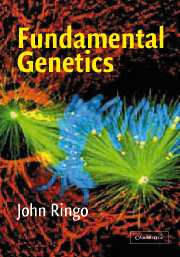Book contents
- Frontmatter
- Contents
- Preface
- Acknowledgments
- Chapter 1 Life Forms and Their Origins
- Chapter 2 Nucleic Acids
- Chapter 3 Proteins
- Chapter 4 Simple Chromosomes
- Chapter 5 Chromosomes of Eukarya
- Chapter 6 Genome Content
- Chapter 7 RNA Synthesis 1: Transcription
- Chapter 8 RNA Synthesis 2: Processing
- Chapter 9 Abundance of RNAs in Bacteria
- Chapter 10 Abundance of RNAs in Eukarya
- Chapter 11 Protein Synthesis
- Chapter 12 DNA Replication
- Chapter 13 Chromosome Replication
- Chapter 14 Molecular Events of Recombination
- Chapter 15 Micromutations
- Chapter 16 Repair of Altered DNA
- Chapter 17 Reproduction of Bacteria
- Chapter 18 Horizontal Gene Transfer in Bacteria
- Chapter 19 Cell Cycles of Eukarya
- Chapter 20 Meiosis
- Chapter 21 Chromosomal Abnormalities
- Chapter 22 Life Cycles of Eukarya
- Chapter 23 Reproduction of Viruses
- Chapter 24 Genetic Processes in Development
- Chapter 25 Sex Determination and Dosage Compensation
- Chapter 26 Cancer
- Chapter 27 Cutting, Sorting, and Copying DNA
- Chapter 28 Genotyping by DNA Analysis
- Chapter 29 Genetically Engineered Organisms
- Chapter 30 Genomics
- Chapter 31 Behavior of Genes and Alleles
- Chapter 32 Probability and Statistics Toolkit
- Chapter 33 Genes, Environment, and Interactions
- Chapter 34 Locating Genes
- Chapter 35 Finding and Detecting Mutations
- Chapter 36 Cytoplasmic Inheritance
- Chapter 37 Genetic Variation in Populations
- Chapter 38 Mutation, Migration, and Genetic Drift
- Chapter 39 Natural Selection
- Chapter 40 Quantitative Genetics
- Chapter 41 Speciation
- Chapter 42 Molecular Evolution and Phylogeny
- Glossary
- Index
Chapter 36 - Cytoplasmic Inheritance
Published online by Cambridge University Press: 05 June 2012
- Frontmatter
- Contents
- Preface
- Acknowledgments
- Chapter 1 Life Forms and Their Origins
- Chapter 2 Nucleic Acids
- Chapter 3 Proteins
- Chapter 4 Simple Chromosomes
- Chapter 5 Chromosomes of Eukarya
- Chapter 6 Genome Content
- Chapter 7 RNA Synthesis 1: Transcription
- Chapter 8 RNA Synthesis 2: Processing
- Chapter 9 Abundance of RNAs in Bacteria
- Chapter 10 Abundance of RNAs in Eukarya
- Chapter 11 Protein Synthesis
- Chapter 12 DNA Replication
- Chapter 13 Chromosome Replication
- Chapter 14 Molecular Events of Recombination
- Chapter 15 Micromutations
- Chapter 16 Repair of Altered DNA
- Chapter 17 Reproduction of Bacteria
- Chapter 18 Horizontal Gene Transfer in Bacteria
- Chapter 19 Cell Cycles of Eukarya
- Chapter 20 Meiosis
- Chapter 21 Chromosomal Abnormalities
- Chapter 22 Life Cycles of Eukarya
- Chapter 23 Reproduction of Viruses
- Chapter 24 Genetic Processes in Development
- Chapter 25 Sex Determination and Dosage Compensation
- Chapter 26 Cancer
- Chapter 27 Cutting, Sorting, and Copying DNA
- Chapter 28 Genotyping by DNA Analysis
- Chapter 29 Genetically Engineered Organisms
- Chapter 30 Genomics
- Chapter 31 Behavior of Genes and Alleles
- Chapter 32 Probability and Statistics Toolkit
- Chapter 33 Genes, Environment, and Interactions
- Chapter 34 Locating Genes
- Chapter 35 Finding and Detecting Mutations
- Chapter 36 Cytoplasmic Inheritance
- Chapter 37 Genetic Variation in Populations
- Chapter 38 Mutation, Migration, and Genetic Drift
- Chapter 39 Natural Selection
- Chapter 40 Quantitative Genetics
- Chapter 41 Speciation
- Chapter 42 Molecular Evolution and Phylogeny
- Glossary
- Index
Summary
Overview
Inherited cytoplasmic factors, unlike nuclear genes, do not segregate or assort regularly in sexual reproduction. This category includes organelle genes, infectious agents, and mRNAs. Extranuclear genes reside in mitochondria, chloroplasts, and cytoplasmic intracellular parasites. Prions infect somatic cells of animals and thereafter are inherited cytoplasmically. This chapter focuses on the modes of cytoplasmic inheritance and methods of analysis.
Mitochondria and Chloroplasts
Characteristics of Mitochondria and Chloroplasts
The mitochondrion is the site of oxidative metabolism in eukarya. There are two membranes separated by a space; the innermost space of the mitochondrion is the matrix. Initial oxidation of fatty acids happens between the two membranes; the oxidation of acetyl-CoA, the citric acid cycle, and β-oxidation of fatty acids take place inside the matrix. The electron transport system and the enzymes of oxidative phosphorylation reside in the inner membrane. The number of mitochondria per cell may be 1 to ~105, depending on cell type and species.
Mitochondria reproduce clonally, by splitting. The mitochondrion has a small chromosome (14 to 2500 kb), present in multiple copies because its replication is not tightly coordinated with organelle division. Chromosomes segregate into daughter mitochondria. Mitochondria have their own machinery for protein synthesis, but nuclear genes encode most mitochondrial proteins.
Mitochondria are distributed to daughter cells during cell division in a haphazard way. Suppose a mutation arises in one of the many mitochondria in an actively cycling cell.
Information
- Type
- Chapter
- Information
- Fundamental Genetics , pp. 349 - 358Publisher: Cambridge University PressPrint publication year: 2004
